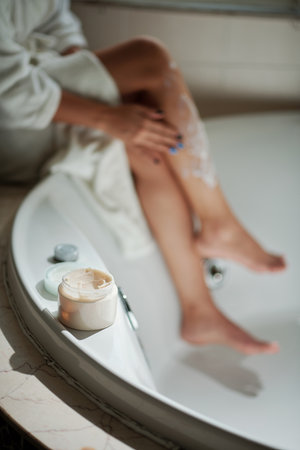1. Understanding Sensitive Skin in the UK Climate
Living in Britain means adapting to a notoriously unpredictable climate—one minute it’s drizzling, the next it’s blustery or unexpectedly sunny. For those with sensitive skin, this constant fluctuation can present a host of unique challenges. The British weather, with its frequent shifts between damp cold winters and humid summers, often leads to moisture loss and irritation, making sensitive skin even more reactive. Another local concern is hard water, which is prevalent in many parts of the UK. Hard water contains high levels of calcium and magnesium, which can strip natural oils from the skin during bathing and exacerbate dryness and itchiness—common complaints for sensitive skin types. Seasonal changes only intensify these effects; winter brings biting winds that sap hydration, while spring and autumn introduce allergens like pollen that can trigger flare-ups. Understanding these factors is key to selecting bath products that not only cleanse gently but also offer protection and nourishment tailored to the specific needs of sensitive skin in Britain.
2. What Makes a Bath Oil or Bath Bomb Hypoallergenic?
When it comes to soothing sensitive skin, not all bath products are created equal. The term “hypoallergenic” is often seen on labels, but what does it truly mean for bath oils and bath bombs in Britain? Let’s break down hypoallergenic claims, highlight the key ingredients to look for, and underscore why avoiding common irritants is essential for delicate skin types.
Understanding Hypoallergenic Claims
“Hypoallergenic” suggests that a product is less likely to trigger allergic reactions. However, there’s no universal standard or legal definition in the UK—so it’s crucial to scrutinise ingredient lists rather than simply trusting marketing buzzwords. Reputable British brands often back their claims with dermatological testing and transparency about their formulations.
Key Ingredients to Look For
The best hypoallergenic bath oils and bath bombs focus on gentle, skin-loving ingredients while skipping harsh chemicals. Here’s a quick reference table of what to seek out and what to avoid:
Ingredients to Seek Out |
Why They’re Beneficial |
|---|---|
| Colloidal Oatmeal | Soothes irritation and provides a protective barrier |
| Coconut Oil & Sweet Almond Oil | Nourishing, lightweight moisturisers that rarely cause reactions |
| Chamomile & Calendula Extracts | Natural anti-inflammatories ideal for calming sensitive skin |
| Magnesium Salts (Epsom Salt) | Relieves itchiness and supports skin health without harshness |
| Aloe Vera Juice | Hydrates and soothes, suitable even for reactive skin types |
Common Irritants to Avoid
Ingredients to Avoid |
Potential Risks for Sensitive Skin |
|---|---|
| Synthetic Fragrances & Perfumes | Known to trigger allergies and flare-ups in sensitive individuals |
| Sulphates (SLS/SLES) | Can strip natural oils, causing dryness and irritation |
| Artificial Colours & Dyes | Linked to rashes and sensitivities, especially in bath bombs |
| Methylisothiazolinone & Parabens | Chemical preservatives with high allergenic potential |
| Essential Oils in High Concentrations* | Even natural ingredients can be irritating if not used carefully (especially citrus oils) |
*Note: While some essential oils are well-tolerated in low concentrations, always patch-test new products if your skin is highly reactive.
The Importance of Ingredient Transparency in Britain
The best British brands catering to sensitive skin understand the importance of ingredient transparency. Look for clear labelling, minimal ingredients, and those free from known allergens. Brands that provide detailed sourcing information or offer fragrance-free options are often more trustworthy for those with easily irritated skin.

3. Top Hypoallergenic Bath Oils Available in Britain
When it comes to sensitive skin, choosing the right bath oil is key to avoiding irritation and maintaining a healthy skin barrier. The British market offers a range of hypoallergenic bath oils that focus on gentle, soothing ingredients specifically formulated for delicate skin types. Here’s an ingredient-focused breakdown of some of the most popular hypoallergenic bath oils you can find across the UK, along with their benefits.
1. Aveeno Skin Relief Soothing Bath Oil
Main Ingredients:
Colloidal Oatmeal, Mineral Oil (Paraffinum Liquidum), Avena Sativa (Oat) Kernel Oil
Benefits for Sensitive Skin:
Colloidal oatmeal is renowned for its anti-inflammatory and soothing properties, making it ideal for calming irritated or reactive skin. Mineral oil creates a protective barrier to lock in moisture without clogging pores, while oat kernel oil further nourishes and softens. This blend is fragrance-free and tested to minimise allergic reactions, making it suitable even for eczema-prone users.
2. E45 Emollient Bath Oil
Main Ingredients:
Paraffinum Liquidum (Liquid Paraffin), Cetyl Dimethicone
Benefits for Sensitive Skin:
This dermatologist-recommended formula uses liquid paraffin—a gentle emollient that helps restore the skin’s lipid layer and prevent dehydration. Cetyl dimethicone adds a silky feel while enhancing moisture retention. E45’s unscented and colourant-free approach reduces the risk of flare-ups and is well-loved among those with chronic dry or sensitive skin in the UK.
3. Childs Farm Baby & Child Bath Oil
Main Ingredients:
Prunus Amygdalus Dulcis (Sweet Almond) Oil, Vitis Vinifera (Grape) Seed Oil, Tocopherol (Vitamin E)
Benefits for Sensitive Skin:
This plant-based option is especially popular among families seeking a natural solution. Sweet almond oil is rich in fatty acids that soothe and protect, while grapeseed oil offers lightweight hydration. Vitamin E acts as an antioxidant to help repair stressed skin. It’s paediatrician-approved and safe for even newborns, but many adults with sensitive skin also enjoy its mildness.
Choosing the Right Bath Oil: What to Avoid
If you’re browsing local chemists or high street shops like Boots or Superdrug, always check labels for added fragrances, artificial colourants, or harsh preservatives—these are common irritants best avoided by those with sensitive skin. Instead, seek out formulations boasting minimal ingredients and those certified as hypoallergenic or dermatologically tested.
Cultural Tip:
Across Britain, hypoallergenic bath oils are not just a luxury—they’re an essential part of many people’s self-care routines, particularly during chilly months when central heating can dry out the skin further. Opting for trusted local brands ensures both quality and accessibility when caring for sensitive skin at home.
4. Best Hypoallergenic Bath Bombs for Sensitive Skin
When it comes to soothing sensitive skin, choosing the right bath bomb can make all the difference. British shoppers with delicate skin often seek products that are gentle, fragrance-free, and coloured using natural pigments rather than synthetic dyes. These thoughtful details help to minimise irritation and support a relaxing bath experience without compromising on safety.
Key Ingredients for Sensitive Skin-Friendly Bath Bombs
Hypoallergenic bath bombs typically avoid harsh chemicals, artificial fragrances, and strong colourants. Instead, they rely on calming ingredients such as colloidal oatmeal, chamomile extract, or calendula oil—renowned for their soothing properties. Below is a comparison of popular hypoallergenic bath bomb options available in the UK market:
| Brand | Main Ingredients | Fragrance-Free | Natural Colourants | Sensitive Skin Suitability |
|---|---|---|---|---|
| Balmonds | Colloidal Oatmeal, Coconut Oil, Shea Butter | Yes | Yes (Clay & Plant Extracts) | Excellent |
| Bloomtown | Cocoa Butter, Kaolin Clay, Calendula Oil | Yes | Yes (Botanical Powders) | Very Good |
| Evolve Organic Beauty | Aloe Vera, Chamomile, Sunflower Oil | Yes | Yes (Mineral Pigments) | Excellent |
| Lush “Dreamtime” Bomb | Lavender Oil, Chamomile Blue Oil, Cocoa Butter | No (Light Scent) | Yes (Natural Extracts) | Good (Patch Test Recommended) |
| The Little Soap Company | Pure Essential Oils, Bicarbonate of Soda, Citric Acid | Yes (Unscented Version) | Yes (No Artificial Colours) | Excellent |
How to Choose the Right Bath Bomb in Britain?
Read the Label: Always look for UK brands that clearly label their products as hypoallergenic and suitable for sensitive skin.
Avoid Synthetic Fragrances: Opt for fragrance-free or naturally scented options using pure essential oils only if your skin tolerates them.
Select Natural Colours: Choose bath bombs coloured with clay, botanical powders, or mineral pigments instead of synthetic dyes.
Consider Local Brands: Support British companies focused on gentle formulations tailored to local water conditions and climate.
Your Bathing Ritual: Simple Yet Soothing
If you’re new to bath bombs or have struggled with skin reactions in the past, start with a patch test before full immersion. Enjoy shorter soaks initially—10 to 15 minutes is ideal—and moisturise immediately after bathing with a hypoallergenic lotion. By sticking to these guidelines and selecting thoughtfully formulated British bath bombs, you can transform your bath time into a safe and calming ritual.
5. How to Use Bath Oils and Bath Bombs Safely with Sensitive Skin
Patch Testing: Your First Line of Defence
Before indulging in any new bath oil or bath bomb, always perform a patch test to minimise the risk of reactions. Apply a small amount of diluted bath oil or a tiny piece of the bath bomb to a discreet area of skin—such as behind your ear or on your inner arm. Wait at least 24 hours and monitor for redness, itching, or irritation. If your skin remains calm, you can proceed with confidence.
Gentle Bathing Rituals for Sensitive Skin
Optimal Water Temperature
Hot baths may seem soothing, but they can strip sensitive skin of its natural oils, leaving it parched and vulnerable. Opt for warm (not hot) water—ideally around 37°C—to maintain skin barrier integrity while still enjoying a relaxing soak.
Mindful Product Use
When adding bath oils, pour just a capful into the running water to disperse evenly and prevent concentrated contact with the skin. For bath bombs, let them fully dissolve before getting in to avoid direct exposure to undiluted ingredients. Always choose products labelled “hypoallergenic” and free from known irritants like artificial fragrances, sulphates, or harsh colourants.
Softer Soak Duration
Limit your bath time to 10–15 minutes. Prolonged soaking—even in gentle formulas—can compromise the delicate lipid barrier of sensitive skin, leading to post-bath dryness and discomfort.
Post-Bath Care Essentials
Pamper with Patting Dry
After bathing, gently pat your skin dry with a soft towel rather than rubbing. This minimises friction and helps retain moisture on the surface.
Seal in Hydration
While your skin is still slightly damp, immediately apply a fragrance-free, hypoallergenic moisturiser or body oil. This step locks in hydration and creates an additional protective layer against environmental stressors.
Extra Tips for Ongoing Comfort
Always store your bath products away from direct sunlight and moisture to preserve their efficacy. Rotate between different gentle formulations if you notice any build-up of sensitivity over time. And above all, listen to your skin—if irritation ever occurs, discontinue use and consult with a dermatologist for tailored advice.
6. The British Approach: Local Brands and Ingredient Sourcing
When it comes to sensitive skin solutions, the UK offers a wealth of homegrown bath oil and bath bomb brands that prioritise clean, ethical, and hypoallergenic formulations. British consumers are increasingly attentive to product origins and ingredient transparency, making the local market a leader in sensitive skin care innovation.
Championing Homegrown Excellence
Many beloved British brands stand out for their dedication to gentle formulas. Bramley, for example, harnesses native botanicals and avoids synthetic colours or harsh preservatives, ensuring their bath oils soothe rather than irritate. Bath House sources natural essential oils and plant extracts from UK suppliers, blending them into hypoallergenic products ideal for delicate complexions.
Ethical Sourcing & Local Ingredients
The best British bath brands emphasise traceability and sustainability. Look for products containing oat kernel oil from Scottish farms, chamomile grown in English meadows, or Cornish sea salt—all naturally calming choices for sensitive skin. These ingredients not only support local agriculture but also reduce the risk of irritation by limiting unnecessary additives and allergens.
A Commitment to Skin Kindness
For those with easily-reactive skin, choosing a UK-made bath oil or bomb with a short, recognisable ingredient list is crucial. Brands like Bloomtown and Neal’s Yard Remedies are transparent about their formulations and never use synthetic fragrances or dyes—just pure, plant-based goodness that respects your skin’s barrier.
By supporting British brands devoted to ethical sourcing and gentle ingredients, you can indulge in luxurious bath time rituals without compromising your skin’s health or your values.


